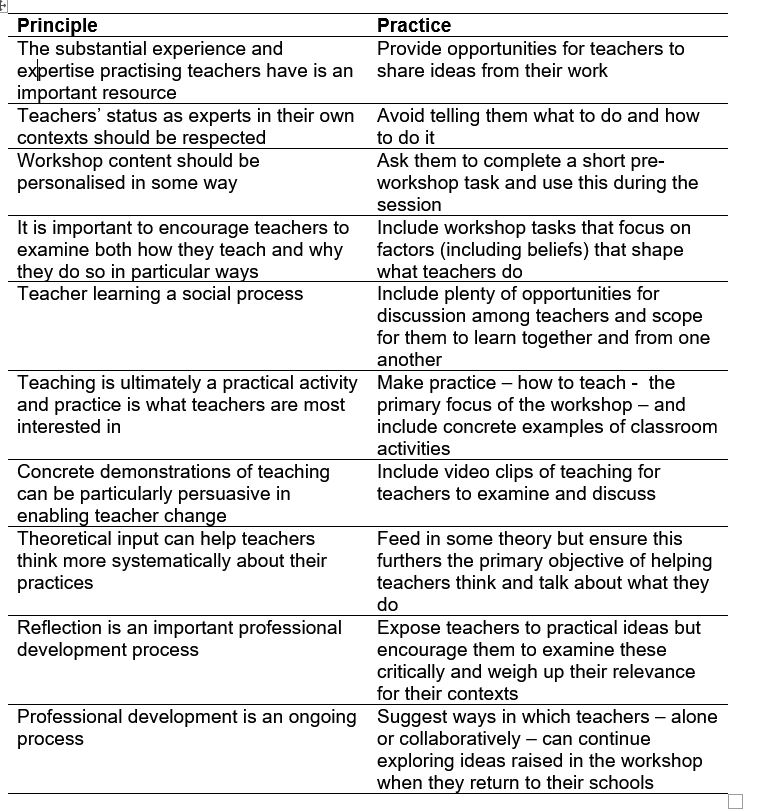COVID–19 has made remote teaching a necessity for educators around the world. Levels of preparedness for this sudden transition have varied, with the result that many educators have faced the challenge of adapting rapidly and learning by doing, while continuing to support their students as best as they can. One of my current projects focuses particularly on teacher educators and the competences they need to support teachers remotely.
While much has been written about the digital competences that teachers and students need, less work is available on the knowledge and skills that remote teacher educators require. Some sources I have found useful are:
- The DigiCompEdu framework
- The TPACK framework
- The ‘Community of Inquiry’ (CoI) framework
- Carrillo and Flores (2020) – a literature review on COVID–19 and teacher education
- Educator roles in online courses (Ní Shé et al. 2019)
- Teacher Educator Technology Competences (Knezek, Christensen and Furuta 2019)
- Murray’s 2013 analysis of online language teacher education.
One recurrent point from this literature is that working online is different, in terms of both educator roles and the skills they need. Another is that the direct transfer of face–to–face teaching strategies will not be effective in an online environment.
While frameworks such as TPACK and CoI were designed with teachers in mind, they are helpful in thinking about what online teacher educators need to know and be able to do. From TPACK, we can conclude that teacher educators will need a sound general knowledge of and familiarity with technology, a more specific understanding of the technologies that can support teacher learning and a knowledge of how to use these technologies pedagogically in a teacher education context. According to CoI, effective online learning environments are characterised by social presence, teaching presence and cognitive presence. Online teacher educators, therefore, need to be able to create supportive social conditions, appropriately designed and facilitated teaching, and concrete, contextualised and deep learning.
In the project I have been working on (which was supported by the British Council) , we were particularly interested in in–service language teacher educators working in less well–resourced contexts. Over 400 respondents from 71 countries completed an online survey and told us about their experiences as remote teacher educators. Some key findings were that:
- almost half of the respondents had their first experience as remote teacher educators in 2020
- smart phones and mobile internet connections (rather than laptops and tablets) were the technologies that were most widely used to support teachers remotely (although the cost of mobile data was often a concern)
- common remote teacher education practices among the respondents were online video meetings, live online workshops and social media group discussions
- WhatsApp, video conferencing apps and e-mail were the tools teacher educators used most commonly to share content with teachers (see Figure 1).

Figure 1: Sharing content remotely with teachers (N=426)
When asked about the competences they needed to work remotely, the three most common answers provided by the teacher educators were ‘creating a positive online learning environment’ (89.2%), motivating teachers to be active in online groups (80.8%) and helping teachers improve their own digital competences (79.1%).
Reflecting on their experiences in 2020, these remote teacher educators were quite positive; most felt that working online had been challenging but also enjoyable. They also felt that they had access to the support they needed for this new role. One general challenge, though, was that among the teachers they worked with remotely, levels of digital competence were often modest.
While an interesting start at developing a better understanding of remote language teacher education practices and the competences that remote teacher educators need, surveys of this kind (and this other relevant report) are limited into the insight they can provide into important questions about processes, quality and outcomes. More work is needed, then, to examine
- what exactly remote language teacher educators do
- the factors that shape their pedagogical approach as remote teacher educators
- the quality of remote teacher educator practices
- what teachers learn through remote teacher education
- the kinds of support remote teacher educators need.


